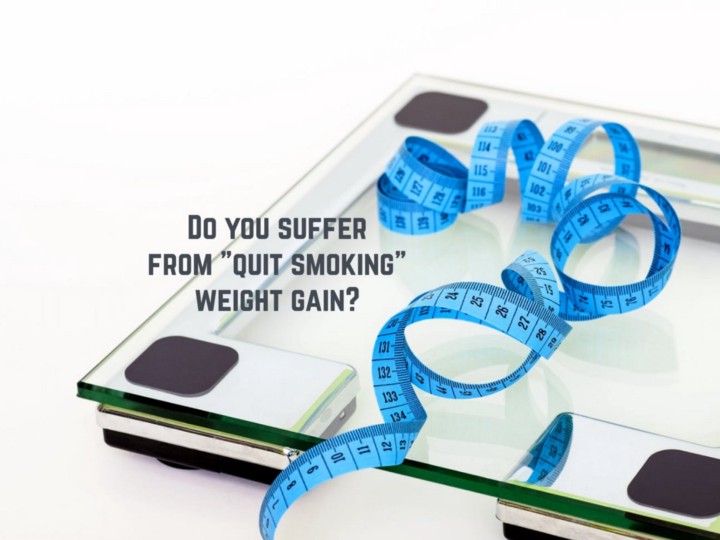Why do you gain weight when you stop smoking?
Learn more about weight gain after quitting smoking thanks to our guide. Discover the main reasons and understand why you are gaining weight. Keep reading.

OK, there is no doubt that some people do gain weight when they stop smoking — but it certainly isn’t always the case. Most people who use Allen Carr’s Easyway to Quit Smoking tend not to pile on the pounds — but in some cases even they do.
So, what’s the answer?
Common reasons for weight gain after quitting smoking
Firstly, there really isn’t any chemical/biological reason why you should have gained weight. Although smoking does speed up your metabolism — it does so marginally and not enough to have any serious impact on our weight.
If you have any doubts about that — think how hard and long you have to peddle on an exercise bike in the gym to burn off a measly couple of hundred calories. There really wasn’t that kind of calorie burning, fat burning process going on while you smoked.
The only explanation must be that you are eating more than usual since you stopped smoking, and this can be caused by one of several things. Funnily enough — cigarettes being an appetite suppressant isn’t one of them — it isn’t particularly effective as that — even though it seems to be so when we smoke. I cover this in more detail in the latest, upgraded version of the method in the book “Allen Carr’s Easyway to Quit Smoking”, likewise in our live seminars.
Why has your food consumption increased since you quit smoking? It can be down to one (or more) of these reasons.
1. Substitution:
If you are finding it hard not to smoke you can be tempted to eat or drink instead of smoking. This is straight forward substitution, “I can’t have a cigarette anymore — I’ll have….”
Even if apparently innocent, low calorie, healthy foods are eaten in this situation (vegetables or fruit) the result is still terrible. Any feeling of deprivation you might feel because you think you miss cigarettes is made greater by substitution. It reinforces the feeling that something is missing — and endless, self-perpetuating misery results as you feel more and more deprived of cigarettes and more and more miserable about weight gain.
Even when someone feels happy to be a non-smoker and doesn’t miss smoking at all — substitution can creep in if they engage in it casually, mistakenly believing it to be harmless. It can create a feeling of deprivation that wasn’t there before by encouraging the thought process, “I don’t smoke but I can have this”. It’s always, always best to avoid substitution of any sort.
If you feel you’ve substituted and that it’s led to weight gain don’t beat yourself up. You’ve done an amazing, wonderful, brilliant thing by stopping smoking. If you’re still struggling, that’s what’s likely to be causing the substitution so please do get in touch with us for some free of charge advice on how to get the method to gel for you properly (see the link at the end).
In no time at all you’ll be fine and dandy. Likewise, if you’ve found it easy to stop smoking and have slipped into substitution then you can easily remedy that — just keep reading.
2. The Lap of Honour
This is where someone has successfully stopped smoking, has absolutely no desire whatsoever to smoke, and is finding it super-easy. Gradually, “the lap of honour” syndrome creeps in. Your freedom is wonderful, but you begin to use it as an excuse to treat yourself to all sorts of things you wouldn’t normally have.
The attitude is very much “Yay — I’ve done so well — I quit smoking — I should definitely reward myself by having that biscuit, that cake, that pastry, that dessert, that chocolate bar…” and so on. It’s easy to imagine how this thought process can lead to over-eating. Actually, worse than that — it can quickly create and then perpetuate a feeling of deprivation that was never there in the first place…creating a substitution issue all of its own.
If this sounds like your situation — be cool — put the “brakes on” your lap of honour and start making the same decisions about what you will eat as you’ve made all your life. The lap of honour is over and it’s time to move on with your life and just rejoice at being a happy non-smoker. You will find this process easy once you identify it for what it is, and it is entirely within your gift to walk away from it.
3. Same ol,’ Same ol’
It’s a bitter pill to swallow, but the other cause of post quit weight gain may be that you have experienced peaks and troughs in your weight throughout your lifetime — with your weight going up and down regularly. When this is the case, we often find ourselves wanting to blame a period of increased weight on something. Anything in fact. Quitting smoking is a fine contender and has us feel somewhat “let off the hook” and not accountable for what’s happened to us.
If this sounds like your situation, please be cool, be kind to yourself, but consider the situation as it really is. It’s a continuation of your normal pattern of life. You can definitely get yourself back on track and you can definitely enjoy doing so either by using whatever regime has worked for you in the past — or even something different. Allen Carr’s “Easyway to Quit Emotional Eating” and “Good Sugar, Bad Sugar” books (and online video programmes and live group seminars) can help you move forward inspired to enjoy a healthier, happier, more exciting relationship with food and eating.
4. Tickling Taste Buds
The only other cause of overeating after quitting smoking can be the fact that your taste buds return to normal very quickly after stopping. This initially causes lots of foods to taste even more wonderful than they did while you were a smoker and can be a fabulous thing to experience. Maybe portion sizes get a little bigger for a while, snacking increases, and it turns into a procession or fanfare of tastes as you enjoy your food much more. If this is the case, and there is no sense of missing cigarettes driving it, it is easy to remedy. Firstly, you’ll soon be taking your new found taste buds for granted. You end up considering them normal and go back to eating normally. Think about it, how long after wearing a smashing new jacket is it before it becomes “just another jacket” rather than anything special? Not long. This is why most people who gain weight after stopping smoking gradually return to their previous weight.
In the meantime, make sure you concentrate on eating foods which you can enjoy without guilt — this is pretty easy — particularly because you will find the taste of fruit and vegetables truly amazing now. Do understand, this is not a green light for substitution — this is only relevant if you are finding it easy not to smoke. You can enjoy your food more — just make sure your selections are right. You know what’s good to eat and not so good to eat — so follow your instincts.
I hope that all makes sense and that if you’ve gained weight after stopping smoking the above provides reassurance and a road map out of the weight gain trap.
Don’t forget — we are always happy to offer free of charge advice and guidance to anyone struggling to succeed with Allen Carr’s Easyway. To obtain that guidance select SUPPORT on this link. You’ll then get to fill out a short questionnaire about your experience with the method — and based on that — a senior Allen Carr Therapist will provide you with bespoke, detailed, free of charge advice on how to get the method to gel for you.




